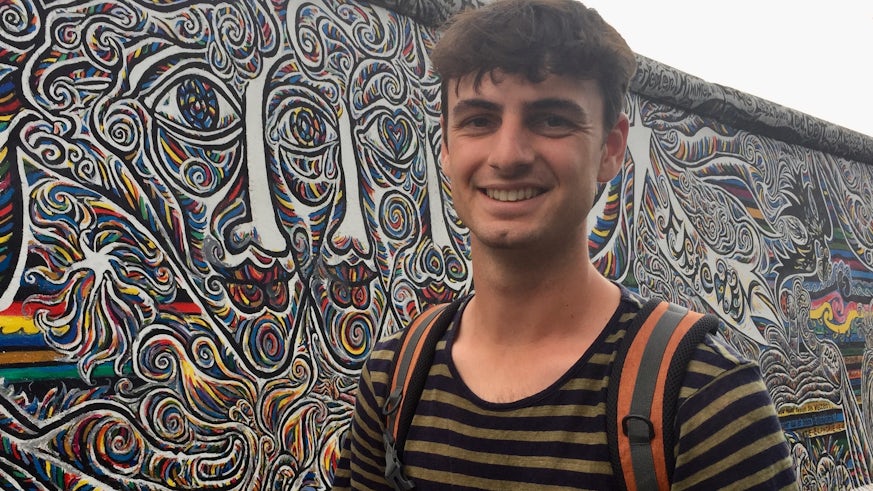Research student creates ‘mini dictionary’ of new Welsh terms while carrying out cutting-edge research
18 July 2020

A Cardiff University PhD student is not only leading the way when it comes to his scientific research - he’s also treading new ground in the Welsh language.
Bedwyr Ab Ion Thomas is carrying out his research into fatal diseases entirely in Welsh - and sometimes this means creating entirely new Welsh words.
“It is completely natural to me to be studying and researching in my mother tongue - but there are extra challenges,” he said.
“The only terminology - or even jargon - that exists for some of the scientific areas I’m looking at is in English or Latin so I am having to make up my own words in Welsh. My aim is to have a mini dictionary with new terms to add to the Welsh language by the end of my PhD.”
Bedwyr, 23, from Cardiff, believes he is among “a handful” of students across Wales who are currently carrying out scientific PhDs in Welsh. His research project is partly funded by the Coleg Cymraeg Cenedlaethol.
He spoke about his experiences as Cardiff University prepares to hold a virtual postgraduate open day for prospective students today.
For Bedwyr, being able to conduct his research at the University’s Medicines Discovery Institute in Welsh is vital - and he hopes other students will follow suit.
“It’s a viable, valuable and exciting opportunity for anyone. Being able to live, study and work through the medium of Welsh in Wales should be the norm and my hope is that many others will also see this as a great start to their career,” said the former Ysgol Gyfun Gymraeg Plasmawr student.
Bedwyr, who studied Chemistry at Oxford University, started his PhD in Medicinal Chemistry last year. He is attempting to develop therapies for the treatment of rare prion diseases, which are transmissible, neurodegenerative diseases that are always fatal. They include Mad Cow Disease, Kuru and Creutzfeldt-Jakob disease.
As opposed to the way in which diseases are usually spread via parasites, bacteria and viruses, prion diseases stem from the misfolding of the prion protein itself which is already present in our bodies.
“There’s currently no treatment for those suffering from these types of diseases. I’m using computational and synthetic chemistry to target prion proteins in the hope that this will lead to creating successful therapies in the future,” he said.
Bedwyr is also breaking new ground in the Welsh language - and this is where it gets a little more complicated.
“An interesting and somewhat unusual aspect of my research involves ‘minting’ new words and refining scientific terms in Welsh,” he said.
“For example a ‘binding pocket’ in a protein is where a drug would bind. Currently there is no consensus as to what word should be used as a rule to describe this in Welsh - I use ‘poced feindio’, but there are many other words that could be used to convey this: twll, safle instead of poced or rhymo, clymu instead of beindio.”
These inconsistencies emphasise the need for scientific terms in Welsh to be standardised to avoid confusion. I also hope that I can contribute not only to science but also to the Welsh language - it’s quite exciting in that sense.
Medicines Discovery Institute director Professor Simon Ward is also a Welsh speaker and is passionate about using the language in academic work.
“I think it’s really important for us to show that if you want to study or research any topic in Welsh you can do it. You don’t just have to be studying Welsh poetry in the Middle Ages - you can also do cutting-edge scientific research,” he said.
“It’s so important to us to commit to the Welsh language as part of our research and have it play an intimate role in the discoveries we make. We’re incredibly proud to put Wales at the centre of medical innovation and the Welsh language at the heart of our research.”
Dr Dylan Phillips, senior academic manager at the Coleg Cymraeg Cenedlaethol, said: “The Coleg Cymraeg strongly believes in the need to develop Welsh medium expertise in the sciences. Sixty out of the 150 PhDs sponsored by the Coleg over the last decade have been in the sciences and the Coleg works closely with universities across Wales to ensure students are able to study a wide range of higher education subjects through the medium of Welsh including science subjects.
“Nurturing and supporting talented students such as Bedwyr through their PhD studies is a way of developing expertise in these subjects whilst at the same time creating the next generation of Welsh-medium lecturers and researchers.”
The Coleg has just announced a further fully-funded PhD in medicinal chemistry at the Medicines Discovery Institute, looking at developing novel treatments for motor neurone disease. Further information on how to apply can be found here.
Share this story
The School has an international reputation for its teaching and research, and offers some of the top research-led bioscience curricula in the UK.



